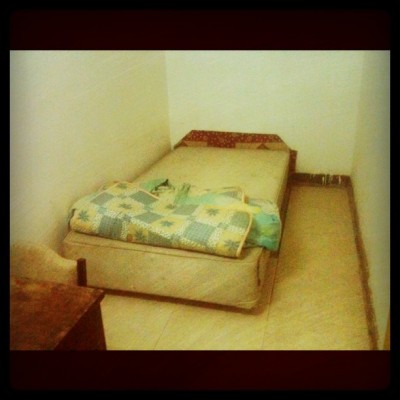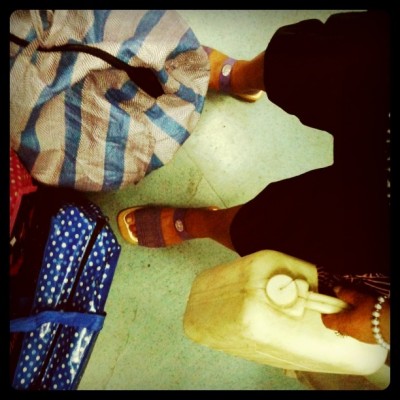Tricia Wang, undercover migrant worker extraordinaire
Follow Tricia in her adventures to put herself in the shoes of migrant workers in Wuhan and to understand youth at the borders (economically and geographically) are using technology in China.
First stop: Room, board and internet in an underground tunnel:
I’ve been touring underground tunnels looking for a short-term rental. This is the room that I’ve decided to rent. The room includes an incredibly dilapidated twin bed and a wooden desk. To give you an idea of the size of this particular room, it’s as big as a large walk-in American closet and smaller than a queen sized bed. These rooms cost 350RMB/month. Some rooms have a double-bed or a TV, and those cost a bit more.
Each room comes with an ethernet cable; internet costs 60RMB/month.
There is no way to tell if it is daytime or nighttime as there are no windows in the room. There are two ways to find out the time of day: look at the time on your cellphone/clock or walk all the way up into the upper-ground world.
Second stop: Going to work with a migrant worker.
She was carrying a bag over 70 pounds on her back. She is 5’2. She has the frame of someone who has been through a lifetime of work, a resilient body that could withstand hunger. I was carrying two bags for her also. Yang Jie also was carrying an plastic container that looked like it had been found on the side of the road – it had dirt encrusted into its crevices.
When we got on the subway, the passengers were not very friendly in giving us space to put down our bags even though the train wasn’t crowded. When Yang Jie put her hands on the pole, passengers moved away from us.
…
I then received a text message so I pulled my phone out. I immediately noticed the man next to me look at me curiously – he saw that I not only had a smartphone, but probably what looked like a real iphone (it is a real iphone). I texted back to my friend in English, and this is when he became super aware that something was off – it’s hard to explain the look on his face, but he just kept looking over my shoulder as if his eyeballs were going to pop out. He then looked at Yang Jie up and down and then at me up and down.
The more he looked, the more I just glared at him and the more upset I became. I wanted to say out loud, “what are you looking at? Do you have a problem? Aren’t we too dirty for your eyes?”
Tricia Wang is an ethnographer researching “how non-elite youth are using digital tools and interacting with the physical city through these tools.” For more information about her, see her bio. For more about her current project, see the Bytes of China blog.
(Hats off to my co-blogger Lyn who tweeted about this a few days ago.)

